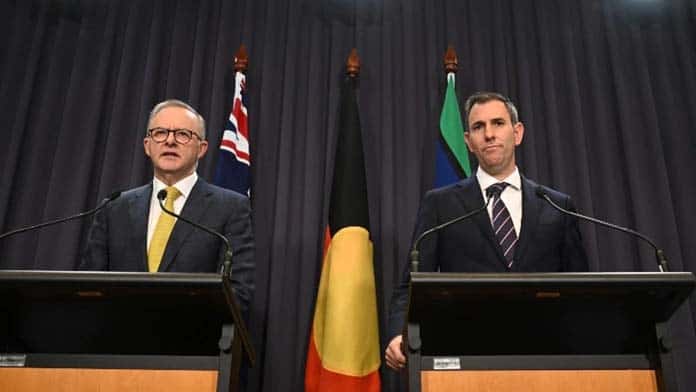After almost a decade of damage from the Coalition’s cuts and failures we need urgent change. But Labor’s first budget is timid and conservative. It makes room for its modest election promises while delivering an approach any conservative would be proud of.
Treasurer Jim Chalmers has boasted about his “spending restraint” and $22 billion in savings.
The new government says “tough times” and a looming global recession have tied its hands. Chalmers delivered a series of excuses, claiming new spending would only fuel inflation—and that doing more is unaffordable because of the debt and deficits the Liberals left behind.
Media commentators have echoed his claims about delivering a “responsible” approach.
But there is nothing responsible about sitting on your hands as living standards are smashed by rising inflation. Workers face a 5.5 per cent real wage cut by the middle of next year. Inflation will soon be near 8 per cent.
Wage rises might begin to match price rises in two years’ time, but it will be a long time before we claw back the losses—if ever.
Chalmers talked of cost-of-living relief but most of it isn’t coming for years. Increased childhood education and care subsidies, one of Labor’s big election promises, begin in the middle of next year. The extension of paid parental leave doesn’t start until mid-2024 and will only reach six months in 2026.
One new announcement was a plan for a million new houses over five years through a “housing accord” with the states and the property industry. This would be no big achievement—a similar number were built in the last five years as well.
All Labor is funding is an extra 10,000 social houses, on top of 30,000 social and affordable homes already promised. This would only meet new demand for one year. And NSW and Victoria alone have more than 100,000 people already on the social housing waiting list.
Rents and house prices are still at obscene levels. But Labor’s plan will do nothing to address the housing affordability crisis.
Inflation fears
Economists admit that inflation is mainly coming from corporate price-gouging, not from higher wages.
Energy bills, for instance, are set to rise an eye-watering 56 per cent in the next two years. The money is going straight into the pockets of the coal and gas companies due to soaring global prices.
Taking back their windfall profits and using them to stop bills surging, or simply imposing price caps, wouldn’t add to inflation. It would simply keep prices where they are. What Labor is really saying is that workers have to cop cuts to living standards so companies can keep higher profits.
There is a pressing need to increase government spending: JobSeeker payments still hold people in crushing poverty on $48 a day, hospitals and aged care are in crisis, public schools are still underfunded, and investment in renewable energy and new jobs for fossil workers is urgent.
The money to pay for it is there: if Labor was prepared to take on big business and the rich.
The most obvious step is scrapping the stage three tax cuts. Anthony Albanese is petrified of breaking his election promise to keep them. But it means he is already breaking another promise—acting on living standards when “everything is going up except your wages”.
The top 3 per cent of income earners, those on over $180,000, get the tax cuts’ biggest benefits. Albanese is siding with the rich instead of workers whose living standards are going backwards.
The tax cuts will cost a colossal $254 billion over the next ten years, according to the latest Treasury estimate.
New weapons
One area where Labor is backing massive spending increases is the military. Defence spending is up 8 per cent this year to $48.7 billion. And most of the cost of new weapons has been deferred to future years, including $170 billion for nuclear subs.
And it is still budgeting $1.5 billion over four years to run offshore detention on Nauru—something that should end immediately. There is nothing in the budget to deliver on promises for permanent visas for those on TPVs and SHEVs.
Labor also promised no new subsidies for fossil fuels, but it has confirmed $1.9 billion for the “middle arm” petrochemical complex in Darwin—designed to support opening gas mines in the Beetaloo basin.
There are tens of billions more that could be raised through taxing fat corporate profits. Corporate price-gouging is fuelling inflation and driving massive windfall gains—yet Labor has passed up the chance to take any of this back.
Gas companies’ gains were up to $40 billion last financial year alone, the Australia Institute estimates. Closing tax loopholes on that one industry could have pulled in an extra $20 billion in tax.
All the mining companies are raking in cash. The original mining super-profits tax proposed under Kevin Rudd’s Labor government would have raised an extra $12 billion a year.
One third of large Australian companies paid no tax in 2019-20, the last year on record. All have an annual income of $100 million or more.
By contrast Labor’s multinational tax avoidance changes look set to raise a measly $500 million a year. Yet there are tens of billions going missing. One company alone, oil giant Exxon-Mobil, booked $71 billion of income over the past seven years of available Tax Office data, yet paid not a cent in tax.
Some had high hopes in what could be achieved in the new parliament. But it’s already clear that Labor is going to deliver only the most minor efforts at change. We need a fight against the new government through strikes and mass protests if we’re going to get anything more.
By James Supple





